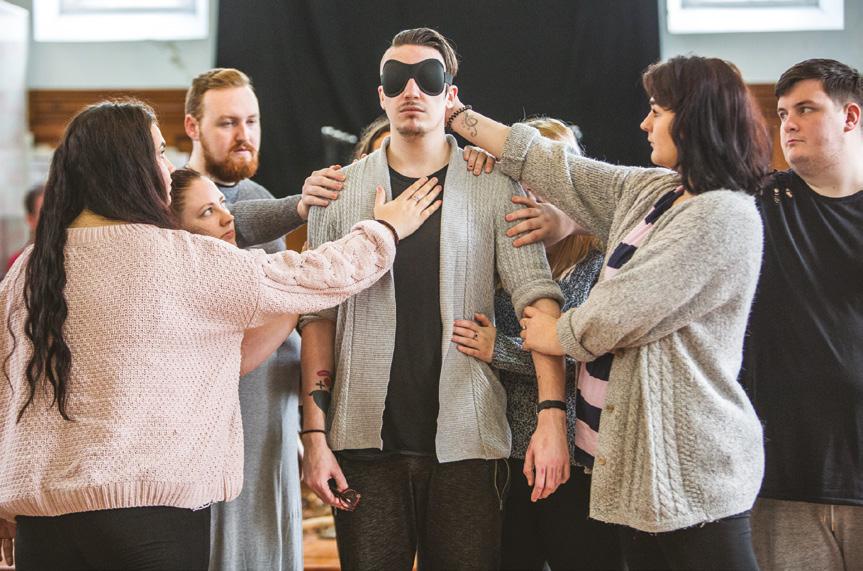Inspiration from ACE Interrupters in Great Britain
References 1. Felitti VJ, Anda RF, Nordenberg D, et al. Relationship of childhood abuse and household dysfunction to many of the leading causes of death in adults. The Adverse Childhood Experiences (ACE) Study. Am J Prev Med 1998; 14(4): 245–258. 2. Anda RF, Felitti VJ, Bremner JD, et al. The enduring effects of abuse and related adverse experiences in childhood. A convergence of evidence from neurobiology and epidemiology. Eur Arch Psychiatry Clin Neurosci 2006; 256(3): 174–186. 3. Bellis MA, Hughes K, Leckenby N, Hardcastle K, Perkins C, Lowey H. Measuring mortality and the burden of adult disease associated with adverse childhood experiences in England: a national survey. J Public Health 2015; 37(3): 445–454. 4. Hughes K, Ford K, Davies AR, Homolova L, Bellis MA. Sources of resilience and their moderating relationships with harms from adverse childhood experiences: Report 1: Mental illness. Wrexham: Public Health Wales and Bangor University; 2018. 5. Bellis MA, Hardcastle K, Ford K, Hughes K, Ashton K, Quigg Z, Butler N. Does continuous trusted adult support in childhood impart life-course resilience against adverse childhood experiences – a retrospective study on adult health-harming behaviours and mental well-being. BMC Psychiatry 2017; 17: 110. DOI 10.1186/ s12888– 017–1260–z. 6. Children’s Commissioner for England. Vulnerable groups and latest data. London: Children’s Commissioner for England; 2019. 7. Hoare G, Boswell K, Kail A. Tackling child abuse in Scotland: a guide for funders. London: The New Philanthropy Capital; 2016. 8. Children of Prisoners Europe. Children separated from parents: based on data from World Prison Brief, Institute for Criminal Policy Research 2019. Available at https:// childrenofprisoners.eu/facts_and_figures/children-separated-from-parents/ [Accessed 03/01/2020] 9. Braveman P, Heck K, Egerter S, et al. Economic hardship in childhood: a neglected issue in ACE studies? Matern Child Health J 2018; 22(3): 308–317. 10. Cronholm PF, Forke CM, Wade R, et al. Adverse childhood experiences: expanding the concept of adversity. Am J Prev Med 2015; 49(3): 354–361. 11. NHS Health Scotland. Adverse childhood experiences in context. Edinburgh: NHS Health Scotland; 2019. 12. Ghanem MAH, Moustafa TA, Megahed HM, Salama N, Ghitani S. A descriptive study of accidental skeletal injuries and non-accidental skeletal injuries of child maltreatment. J Forensic Leg Med 2018; 54: 14–22. 13. Vaithianathan R, Rouland B, Putnam-Horstein E. Injury and mortality among children identified as at high risk of maltreatment. Pediatrics 2018; 141(2): 2882.
14. Oh DL, Jerman P, Silvério Marques S, et al. Systematic review of pediatric health outcomes associated with childhood adversity. BMC Pediatrics 2018; 18(1): 83. 15. Stempel H, Cox-Martin M, Bronsert M, Dickinson LM, Allison MA. Chronic school absenteeism and the role of adverse childhood experiences. Acad Pediatr 2017; 17(8): 837–843. 16. Green BL, Kaltman S, Frank L, et al. Primary care providers’ experiences with trauma patients: A qualitative study. Psychol Trauma; 3(1): 37–41. 17. Hardcastle K, Bellis MA. Routine enquiry for history of adverse childhood experiences (ACEs) in the adult patient population in a general practice setting: A pathfinder study. Cardiff: Public Health Wales; 2018. 18. Ford K, Hughes K, Hardcastle K, et al. The evidence for routine enquiry into adverse childhood experiences: a scoping review. Child Abuse Negl 2019; 91: 131–146. 19. Center on the Developing Child at Harvard University. Supportive relationships and active skill-building strengthen the foundations of resilience: Working Paper No. 13; 2015. Available at https://developingchild.harvard. edu/ resources/supportive-relationships-and-active-skill-building-strengthen-the-foundations-of-resilience/ [Accessed 03/01/2020]. 20. Thomson P, Jacque SV. Attachment and childhood adversity in athletes, actors, dancers, and healthy controls. Int J Sport Exerc Psychol 2019; 17(4): 334–349. 21. Whitley MA, Massey WV, Leonetti NM. ‘Greatness (un) channelled’: the role of sport in the life of an elite athlete who overcame multiple developmental risk factors. Qual Res Sport Exerc Health 2016; 8(2): 194–212. 22. Barnett M. What brings you here? An exploration of the unconscious motivations of those who choose to train and work as psychotherapists and counsellors. Psychodynamic Practice 2007; 13(3): 257–274. 23. Hardcastle K, Bellis MA, Ford K, Hughes K, Garner J, Ramos-Rodriguez G. Measuring the relationships between adverse childhood experiences and educational and employment success in England and Wales: findings from a retrospective study. Public Health 2018; 165: 108–116. 24. Hughes K, Bellis MA, Hardcastle K, et al. The effect of multiple adverse childhood experiences on health: a systematic review and meta-analysis. Lancet Public Health 2017; 2(8): e356–366. 25. Bellis MA, Ashton K, Hughes K, Ford K, Bishop J, Paranjothy S. Adverse childhood experiences and their impact on health-harming behaviours in the Welsh population. Cardiff: Public Health Wales; 2015. 26. Bellis MA, Hughes K, Ford K, Ramos Rodriguez G, Sethi D, Passmore J. Life course health consequences and associated annual costs of adverse childhood experiences across Europe and North America: a systematic review and meta-analysis. Lancet Public Health 2019; 4(10): e517–e528. 59





